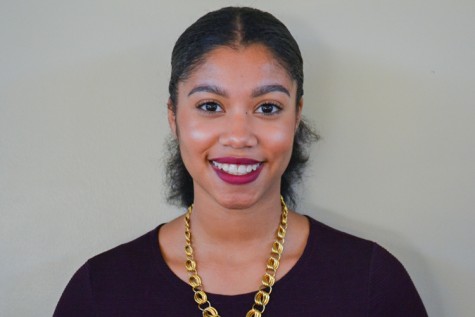The First Annual AP Capstone Colloquium
May 20, 2016
Although the temperature of the library on Friday April 29 was brisk, the atmosphere was warm, pleasant, and inviting as the first annual AP Capstone Colloquium took place.
Mr. Troy Bradbury, who has been the Capstone Seminar and Research teacher for all four years, began the ceremony with a welcoming speech, introducing the Colloquium and thanking faculty that have helped the program such as Mr. Alex Kinder, who came on board this year to help with the Capstone Research class and plans on taking over that class next year, and Ms. Linda Watson.
“The Capstone program itself is all about the students and that’s the most important part; what are the students getting” Bradbury said.
Following, presentations from featured students Kathryn Breon, Olufunke Awowale, Abbigail Henry, and Jasmine Goggins gave insight into what exactly the capstone students research, as well as insight on issues that directly applied to themselves. The presenters described their process.
Olufunke Awowale’s PowerPoint on Correctional Education versus Therapeutic Communities included an introductory slide that contained bars representing prison cells in order to get her point across. Abbigail Henry presented her PowerPoint in the design of a newspaper article.
Jasmins Goggins’ presented on K-Pop’s Effect on Korean Women’s Body Image with a lively demonstration of K-Pop’s effects that included video clips of what-exactly the genre is, images showing how Korean models are photoshopped and objectified, and how they promote being extremely and unhealthily thin as the ideal body type. Goggins described how they create a racial ambiguity through their skin, hair, and faces, and how their image is not representative of what women actually look like. Bradbury’s response was “I barely know what K-Pop is but I want to know more.”
The program came to a close as the 37 students were called up and presented with certificates establishing their achievement while being cheered on by parents and peers.
Although Mr. Bradbury claims there were a few missteps, according to many, the first annual Colloquium proved to be a success.
“The program is great, the students are amazing, and it’s so much different from regular classroom work that it makes it vital and awesome. It’s a lot of fun.” Mr. Kinder who came from the RP standpoint, likes that Capstone is more liberal in the topics that students study. “It gives students the opportunity to explore any field that they like whether it’s humanities, social science or behavioral science.”
Most Capstone students said that the class was very beneficial in preparing them for college courses. Kiegan Thornton said “This class is great for learning how to manage things.” Destini Williams said “It’s given me a lot of research experience that I know I will be doing in college. I know students in grad school that do research that we do.” Elijah Jones agrees with Williams when saying “I feel like this program will help me greatly in terms of research and for the field I’m going in.”
The Capstone program started four years ago. The first two years served as a pilot and started as an actual program last year. Rather than being just a science and technology based course, Capstone students are given the opportunity to research a problem of their interest. For example, Zuha Sadeed did her presentation on Honor Killings because she’s Pakistani and “wanted to create awareness.” Many of the research topics focused on social issues such as The Acceptability of Slut Shaming (Milan Monardes), Shifting the Stigma of Rape Culture in College (Sara Abediyeh), Why is African-American Hair Problematic (Nazeryn Diaz), Preventing Female Genital Mutation (Maissa Signate), Non-Verbal Students in Special Education (Maya Thomas), and Whitewashing in Film (Kiana Green).



